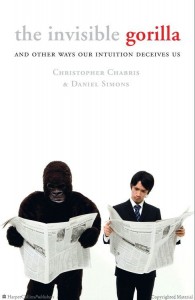 THE INVISIBLE GORILLA: AND OTHER WAYS OUR INTUITION DECEIVES US
THE INVISIBLE GORILLA: AND OTHER WAYS OUR INTUITION DECEIVES US
Christopher Chabris and Daniel Simons
First published 2010
If you’re the kind of person who tends to think you’re always right, then this is the book for you. The Invisible Gorilla takes us bit by bit through faulty processes within the mind. Think in terms of optical illusions, but instead of our perception of an object being distorted, it’s our perception of everyday experience that gets twisted through the activity of being interpreted into thought.
Contrary to intuition, our awareness of the world isn’t literal. Expanding on the visual comparison: just as we see the world through a limited colour spectrum (the red we see is different to the red that birds see, but that doesn’t make us more “right”), so we also perceive and retain only certain information that we encounter. You’d feel pretty confident of noticing a human-sized gorilla walk into the middle of ball game, beat it’s chest, then walk away, right? Seriously, how could anybody miss that? But according to Chabris and Simons, based on their own experiment, you have only a 50/50 chance of noticing that gorilla if you’re focusing on counting ball passes during the game. It’s an example of Inattentional Blindness, and is the same sort of phenomenon that people experience when they fail to see a cyclist on the road. We see what we expect to see, and it sometimes means we miss the obvious.
This is just one example of the way our minds deceives us, and how these deceptions can have negative consequences. Did you know that the majority of confirmed false convictions within the United States are the result of unreliable eyewitness testimony? It’s not that eyewitnesses lie, but memory isn’t a camera. Memory is susceptible to both internal and external influence, and it changes over time. What we remember isn’t necessarily what happened. It’s likely that most of us have experienced a benign form of memory modification, such as when we notice that the memory of a shared event differs between participants. Who said what? Who did what? Unless there’s evidence to prove right or wrong, there’s no way to ever know what occurred.
The Invisible Gorilla is a breath-taking exploration of the unreliability of our assumptions, and an earnest plea for rationality. There are illusions of memory, confidence, causation, knowledge and potential, and we need to navigate each in everyday life. Once we understand the cracks in our perception, we can become more considered in the decisions we make. After reading this book, we can’t help but see the cracks all around us, which hopefully means we’re less likely to trip.

